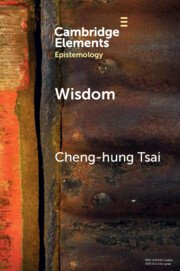Element contents
Wisdom
Published online by Cambridge University Press: 19 December 2022
Summary
- Type
- Element
- Information
- Series: Elements in EpistemologyOnline ISBN: 9781009222884Publisher: Cambridge University PressPrint publication: 19 January 2023
References
- 11
- Cited by



